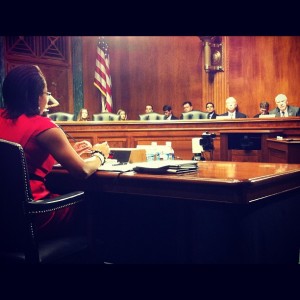
Tanya Clay House, Director of Public Policy for the Lawyers’ Committee for Civil Rights Under Law, testifies before the Senate Judiciary Committee Tuesday.
WASHINGTON— The Senate Judiciary Committee on Tuesday heard testimony from advocates of a proposal that would make it a crime to knowingly mislead
voters about the time, place, eligibility requirements or endorsements in a federal election.
The plan, known as the Deceptive Practices and Voter Intimidation Prevention Act, would outlaw election tactics like “robocalling” or otherwise sending out false information to voters in order to dissuade them from voting. It would also make it a crime to prevent a person from voting or registering to vote.
“This bill addresses actual and documented fraud against voters,” said Tanya Clay House, Public Policy Director of the Lawyer’s Committee for Civil Rights Under Law.
Disenfranchised communities, especially Blacks and Latinos, are often the target of these practices, House said.
She cited numerous examples of voters being dissuaded from participating in elections. One took place in Maryland on Election Day 2010, when voters in a predominately African-American community received strange automated phone calls, allegedly from the Democratic Party.
The message said, “I’m calling to let everyone know that Gov. (Martin) O’Malley and President (Barack) Obama have been successful. Our goals have been met. The polls were correct and we took it back. We’re okay. Relax. Everything is fine. The only thing left is to watch it on TV tonight. Congratulations and thank you,” according to House’s testimony.
But the calls weren’t from the Democrats. They actually came from the campaign of Republican candidate Robert Ehrlich, the opponent of now-Gov. O’Malley, who won the election despite the attempted sabotage.
The Maryland example was not an isolated incident. More than 500,000 people have complained of similar deception to the nonpartisan Election Protection coalition, a project of the Lawyers’ Committee.
House said voters in Colorado, Florida and Virginia received text or online messages stating supporters of certain candidates were to vote on a different day—after the election was over, they would later learn—due to long lines. Some Virginia voters received emails that said Election Day had been postponed altogether, while some Arizona voters received robocalls saying their polling places had been changed to locations far from their correct locations.
Just this month, in Wisconsin’s recall election, voters received calls declaring that they did not need to vote if they had signed a recall petition.
Vermont Sen. Patrick Leahy, the Democratic chairman of the Senate Judiciary Committee and one of the bill’s sponsors, called the practices “evil, as well as illegal”. He said the need for the legislation, similar to one introduced in 2007 by then-Sen. Barack Obama, is documented and real.
“Our bill offers new ways to enforce these prohibitions and combat the dissemination of misleading information,” Leahy said.
While no one disagreed that the practices are indeed a serious problem, there were differences in opinion about how to battle them, and whether or not lawmakers even have the authority to outlaw them.
Playing Devil’s advocate, Leahy asked House, “You’re a civil rights lawyer… Do you have any concerns that this legislation might have a chilling effect on [free] speech?”
House responded that the legislation has been narrowly tailored to include an intent standard. Similar to the standard by which libel is determined, speech deemed a “deceptive” practice under the act, would need to be proven to have had the express intent to deceive or mislead, and the person (or people) responsible would have to have known the information was false.
“The [idea that] we cannot provide for this fundamental right (to vote) because we are worried that somewhere down the line there may the potential, some possibility, that speech may be chilled is simply unacceptable,” House said. “There are limitations on speech, and this is false speech. This is false claims, misrepresentations, misinformation. And therefore it’s not protected.”
The plan will be reviewed again by its sponsors before the committee votes on whether to send the legislation to the Senate floor.
